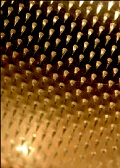 |
| Researchers are using TheraJect's microneedle technology to deliver vaccine.--Courtesy of TheraJect |
Innovators of vaccine-delivery technology generally want to find ways around the use of painful needles and the expensive cold chain. Researchers at King's College London are working toward those goals by using microneedles made of sugar to deliver vaccine through the skin--a cheaper alternative to traditional shots.
Backed by the Bill & Melinda Gates Foundation, the team tapped technology from TheraJect to insert a dried version of a live modified adenovirus-based candidate HIV vaccine into the skin. TheraJect designed a small disc lined with microneedles made of sugar that dissolve after insertion. Researchers tested the method in mice, using imaging to identify a subset of specialized dendritic cells in the skin that prompt an immune response. The research was published in the Proceedings of the National Academy of Sciences.
The dried vaccine remains effective and sound at room temperature. This means that if a cold chain cannot be maintained--a possibility as product makes its way to the developing world--the vaccine will still safely work. This would eliminate the cost tied to keeping a vaccine around 8 degrees Celsius or below as it travels from manufacturer to patient.
"This new technique represents a huge leap forward in overcoming the challenges of delivering a vaccination program for diseases such as HIV and malaria," Dr. Linda Klavinskis, from the Peter Gorer Department of Immunobiology at King's College London, said in a release. "But these findings may also have wider implications for other infectious disease vaccination programs, for example infant vaccinations, or even other inflammatory and autoimmune conditions such as diabetes."
Researchers want to use the technology to tackle HIV, malaria and tuberculosis, three major global health challenges at which the Gates Foundation has taken aim.
- read the release
- get the abstract